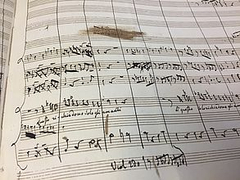From Dresden to Moscow and back: Works from the SLUB relocated during the war will be digitized
Barbara Wiermann
Monday, December 10, 2018

The following is by Barbara Wiermann and originally appeared on the SLUB Dresden Blog of the Sächsische Landesbibliothek – Staats- und Universitätsbibliothek Dresden on 18 November 2018 (CC-BY):
Top-class concerts, exhibitions, a jazz festival, readings, discussions, and congresses - the International Cultural Forum in St. Petersburg is bringing together thousands of people in culture and the arts from all over the world and prominent representatives from business and politics this weekend [18 November 2018]. Also present: the SLUB. General Director Achim Bonte and Vadim V. Duda, General Director of the Russian State Library in Moscow, have signed a groundbreaking cooperation agreement during the forum. This will enable, for the first time, library holdings from Dresden that were relocated as a result of World War II to be accessible digitally to the general public.
A new chapter in German-Russian relations
As a result of World War II, the Soviet Trophy Commission confiscated numerous works from the collection of the Saxon State Library from 1945 onwards. Most of the items were taken from their temporary storage locations in Saxon castles and manors directly to Russia via the Radeberg freight depot. Their whereabouts are still not known for every case. For some years now, representatives of German and Russian libraries have been working together to locate and document the items that were relocated as a result of the war. Now that an agreement has been signed to digitize 250 music manuscripts, the SLUB and the Russian State Library Moscow have taken a decisive further step in their cooperation.
“This is the first time that a German library has succeeded in making items that went to Russia as a result of the Second World War accessible again to the general public by means of joint cataloging and digitization. We are confident that this first digitization project will define the structural framework for future projects,” Achim Bonte said. “We hope to be able to jointly make additional musical material accessible as well as text manuscripts, incunabula, and selected prints from the 16th to 18th centuries.”
More than seventy years after the end of the war, the participating institutions are thus opening up a new chapter in German-Russian relations. After the German invasion of the Soviet Union had brought endless suffering to the country and destroyed many Russian cultural assets, the return of various museum and library collections to East Germany between 1955 and 1959 was seen as a gesture of reconciliation. These included the art treasures of the Dresden Gemäldegalerie and the Green Vault as well as selected items from the Saxon State Library. The digitization that has now been agreed upon is being accompanied by a mutual desire for in-depth scholarly and cultural exchange.
Music of the Dresden Court
The manuscripts, most of which date from the 18th and early 19th centuries and are now being digitized, are music manuscripts from the Saxon court, including performance materials from royal musical life in Warsaw, manuscripts from the private collection of the music patron Princess Maria Antonia Walpurgis, and autograph manuscripts of compositions by Princess Amalie of Saxony (image).
The resulting digital copies will be included in RISM and added to the collection of court music that is preserved in the SLUB and is already accessible online. Scholars, musicians, and anyone else who is interested will thus receive even more complete insight into the cultivation of music at the Dresden court. In the coming months, cataloging and digitization will be accompanied by joint public events in Moscow and Dresden.
We will of course keep you up-to-date in this space as well.
Share Tweet EmailCatégorie: Collections de bibliothèques

